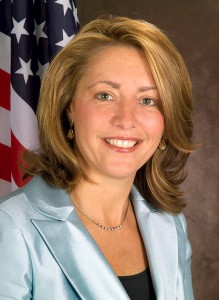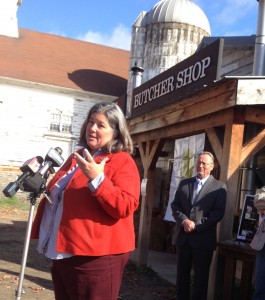By Sanaz Arjomand, M.S. in Environmental Policy 2016

As I’ve seen firsthand as the American Farmland Trust (AFT) New York Policy Intern, it is an exciting time to be an agri-environmental advocate in New York State. From Governor Cuomo’s record-breaking $300 million Environmental Protection Fund budget proposal to nationally-ranked farmland protection funding, offices at all levels of government are forging paths to environmental and agricultural sustainability.
I have also seen this local enthusiasm firsthand in from AFT’s office in Saratoga Springs, “the city in the country” that I have come to know and love. The municipal- and state-level elected officials who represent it are women whose poise and commitment to agricultural and environmental issues I have admired since my arrival. I spoke with Saratoga Springs Mayor Joanne Yepsen and New York State Assemblywoman Carrie Woerner to find out more about their views on leadership as elected officials in the Capital Region.

Mayor Yepsen, who is currently serving her second term, was previously a county supervisor and co-founder of Sustainable Saratoga. Her environmental priorities include fulfilling the city’s Climate Smart Communities pledge, continuing to pursue a complete streets policy, and working with Saratoga PLAN to protect the proposed Community Farm at Pitney Meadows, one of the few remaining farms within city limits.
Assemblywoman Woerner of New York’s 113th district, who is the chair of the Subcommittee on Agricultural Production and Technology and a member of the Assembly’s Agriculture Committee among many others, previously served as executive director of the Saratoga Springs Preservation Foundation and a Village Trustee for Round Lake. Her agricultural priorities include protecting farmland, supporting environmental infrastructure such as anaerobic digesters as family farms increase in size, and encouraging research and development efforts towards precision agriculture and extended growing seasons.
Public Service as Leadership

My first question for both women was about the balance between leading and following as an elected official and public servant. Assemblywoman Woerner explained that she sees herself primarily as a public servant, and that it is important for her to be accessible and to solicit opinions of those she represents—in such diverse venues as Facebook, open office hours, town halls, and community events—so that she can understand the diversity of her constituents and find the “big middle” consensus that works for the 113th district. As Mayor Yepsen pointed out, her electability rests on having common values and a common vision with most of Saratoga Springs, so she sees public service and leadership as one and the same.
Collaboration and Consensus-Building
Of course, not everyone that these leaders represent or work with has a strong agri-environmental ethos. Collaboration and consensus-building were major themes in both conversations. As the Assemblywoman put it, “Nothing happens in the legislature without coalitions. That’s a key skill set—you’ve got to be able to identify people with common problems and common goals, and make common cause with them.”
Both women exemplify what Daniel Goleman characterizes as the democratic style of leadership, which is very apt given their political roles. As Goleman explains, “By spending time getting people’s ideas and buy-in, a leader builds trust, respect and commitment… [and] because they have a say in setting their goals and the standards for evaluating success, people operating in a democratic system tend to be very realistic about what can and cannot be accomplished.”
In practical terms, Mayor Yepsen explained that cultivating a democratic leadership style means “compromising, negotiating, and setting short- and long-term goals.” It also means actively getting other people’s opinions, asking people to serve on committees and boards, and creating new committees in order to have more contact with the community and more perspectives at the table.
Mayor Yepsen, who has worked and campaigned with Assemblywoman Woerner in the past, also noted that both of them were in their respective offices to serve the people and places they represent, not for aspirational or egotistical reasons. This makes it easier to work with others. As the assemblywoman put it, “If your ego doesn’t require that you receive credit for things, then you can insert direction into a group and move them in a certain way—provided you make it possible for other people to continue to see themselves as leaders.”
Leading Ladies
In New York State, 24% of state legislative seats and 15% of mayoral offices in cities with populations over 30,000 are held by women (Saratoga Springs is just under that threshold with a population of about 28,000). According to the most recent Census estimate, however, women make up nearly 52% of the state’s population. Since the collaborative leadership styles we had been talking about are generally more associated with women than with men, I asked both about their experiences as female leaders.

As Assemblywoman Woerner pointed out, building coalitions in a male-dominated environment such as the political arena can be more difficult given that “like gravitates to like.” However, she still finds ample opportunity to provide direction and guidance from within groups and coalitions. She also notes that, by being an outspoken proponent for rural concerns, she is often able to open spaces for others representing non-urban districts to join in and also voice their opinions.
Mayor Yepsen’s take on the matter was that not only are women well-suited to leadership through elected office because they can represent the needs of other women who make up a majority of the population, but also that their very focus on outreach and inclusivity make them particularly well-suited to represent a wide variety of constituents.
Following the Leaders
As we spoke about building coalitions, Assemblywoman Woerner shared a valuable piece of advice that she received from a former employer: “Listen with your mouth shut.” Being able to listen without contemplating one’s next move is essential for learning the aforementioned common problems and common goals. Mayor Yepsen also noted the important roles that mentors and employers can play in cultivating leadership, and advised finding a role model to work for, shadow, and build networks with for careers in local politics in particular.
Finally, both Mayor Yepsen and Assemblywoman Woerner mentioned that they appreciated having a variety of experiences—the Assemblywoman even added gaining a variety of experiences to her list of advice. As someone who has been a researcher, a farmer, a teacher, and a policy analyst, this was especially heartening. Perhaps with such strong examples I will one day add elected official to the list.
